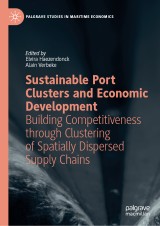Details

Sustainable Port Clusters and Economic Development
Building Competitiveness through Clustering of Spatially Dispersed Supply ChainsPalgrave Studies in Maritime Economics
|
106,99 € |
|
| Verlag: | Palgrave Macmillan |
| Format: | |
| Veröffentl.: | 18.03.2019 |
| ISBN/EAN: | 9783319966588 |
| Sprache: | englisch |
Dieses eBook enthält ein Wasserzeichen.
Beschreibungen
<div><div><div>This book belongs to the <b>Port Economics and Global Supply Chain Management</b> strand of the<i> Palgrave Studies in Maritime Economics</i> book series, commissioned by Hercules Haralambides.</div></div><div><br></div>This book addresses the strategic alignment between port authorities and their supply chain partners, with a focus on governance challenges. Many port (authority) managers are engaged in efforts to improve their strategic alignment with business partners in their proximate geographic region, yet the economic objectives pursued can vary widely. These objectives can include improvements in port competitiveness and stability of traffic flows, as well as better access to scarce resources such as land and capital, or simply more control over the logistics chain. Using various Benelux seaports as case studies, the authors of this volume show that improving strategic alignment can involve a wide variety of different governance choices, ranging from top-down to bottom-up alliance formation, from project-driven to multi-activity collaboration, and from long-term contracting to full-fledged mergers.</div><div><br></div>This book with state-of-the-art insight on modern port governance will be of interest to port managers around the globe, as well as to lecturers and students in maritime educational programs.<div><br></div><div>Chapter 4 is available open access under a Creative Commons Attribution 4.0 International License via link.springer.com.<br></div><div><br></div>
<div><div>1. Introduction: Co-Orchestrating Sustainable Port Ecosystems- Elvira Haezendonck and Alain Verbeke.- 2. A new governance perspective on port-hinterland relationships: the port hinterland impact (phi) matrix- Elvira Haezendonck, Michael Dooms and Alain Verbeke.- 3. The persistent relevance of trans border (focal) regions: the case of the European blue banana- Paul Brugman and Alain Verbeke.- 4. Integrated ports clusters and competitive advantage in an extended resource pool for the Antwerp Seaport- Mychal Langenus and Elvira Haezendonck.- 5. The impact of clusters on firms’ environmental strategies: case study of Antwerp’s chemical cluster- Tim Jans and Elvira Haezendonck.- 6. The impact of collaboration on green competitive advantage in Europe’s largest petrochemical cluster- Tim Jans and Elvira Haezendonck.</div></div>
<div><b>Dr Elvira Haezendonck </b>is Full Professor at the Vrije Universiteit Brussel, Visiting Professor at the University of Antwerp, and a guest lecturer at Erasmus University of Rotterdam and at C-MAT (University of Antwerp). Her research covers advanced subject matters in the fields of (port) management, strategy and policy. She has expertise in complex project evaluation, corporate social responsibility and environmental strategy, competitive analysis and stakeholder management. She has published various articles, books and book chapters in these domains.<b> </b></div><div><b><br></b></div><div><b>Dr Alain Verbeke</b> is Professor of International Business Strategy and holds the McCaig Research Chair in Management at the Haskayne School of Business, University of Calgary. He is also the Area Chair of the Strategy and Global Management Group at the Haskayne School of Business. In 2014, Dr. Verbeke was elected as the Inaugural Alan M. Rugman Memorial Fellow at the Henley Business School, University of Reading (UK). He is the Editor-in-Chief of the <i>Journal of International Business Studies</i> (2017 – 2019) and has authored or edited more than 30 books and more than 200 refereed publications. </div><div><br></div>
<div><div><div>This book belongs to the <b>Port Economics and Global Supply Chain Management</b> strand of the<i> Palgrave Studies in Maritime Economics</i> book series, commissioned by Hercules Haralambides.</div><div><br></div>This book addresses the strategic alignment between port authorities and their supply chain partners, with a focus on governance challenges. Many port (authority) managers are engaged in efforts to improve their strategic alignment with business partners in their proximate geographic region, yet the economic objectives pursued can vary widely. These objectives can include improvements in port competitiveness and stability of traffic flows, as well as better access to scarce resources such as land and capital, or simply more control over the logistics chain. Using various Benelux seaports as case studies, the authors of this volume show that improving strategic alignment can involve a wide variety of different governance choices, ranging from top-down to bottom-up alliance formation, from project-driven to multi-activity collaboration, and from long-term contracting to full-fledged mergers.</div><div><br></div>This book with state-of-the-art insight on modern port governance will be of interest to port managers around the globe, as well as to lecturers and students in maritime educational programs.<div><br></div><div>Chapter 4 is available open access under a Creative Commons Attribution 4.0 International License via link.springer.com.<br></div></div><div><br></div><div><br></div><div><br></div><div> </div>
First scholarly book to address port cluster development and collaboration options Contains unique empirical results on which forms of integration are more likely to result in an improved competitive position Fulfills the knowledge gap sought by port managers considering port cooperation or integration options and expected outcomes
Diese Produkte könnten Sie auch interessieren:

Determinants of Insurance Companies' Performance and their Impacts on Nigerian Insurance Industry

von: Abasiama James

29,99 €
















